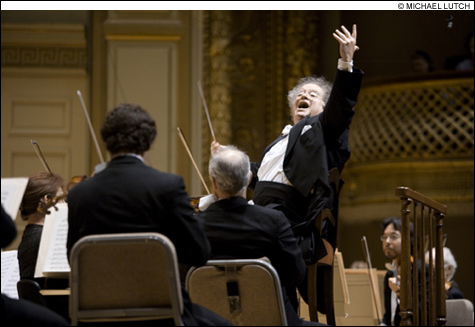The Berlin Philharmonic’s Mahler, the St. Lawrence String Quartet, and the BSO’s Smetana

HE LOVES SMETANA: But James Levine’s Má vlast had an American accent.
|
The season’s most eagerly awaited (and, with its $187 top ticket price, most expensive) classical concert was not a disappointment. The Celebrity Series of Boston brought to Symphony Hall the Berlin Philharmonic Orchestra — the most highly esteemed instrumental ensemble in the world — in its first local appearance under its new music director, Sir Simon Rattle (who many people thought might succeed Seiji Ozawa as director of the Boston Symphony Orchestra before James Levine was appointed). The featured work was Gustav Mahler’s Das Lied von der Erde (“The Song of the Earth”), his late symphonic song cycle, a setting of six Chinese poems, which he called a “Symphony for Tenor and Contralto (or Baritone) with Orchestra” but superstitiously refused to number as his ninth symphony. The two vocal soloists were tenor Ben Heppner — who was both Levine’s tenor in 1994, when he returned to the BSO as a guest conductor after a 16-year absence, and Seiji Ozawa’s in 1998 — and the great German bass-baritone Thomas Quasthoff, who made his Boston debut as Heppner’s partner in 1998, in the part more often sung by a contralto, though in the Chinese poems themselves, it’s surely a man speaking.
In 1998, these two soloists and then BSO principal flute Jacques Zoon rescued Mahler from Ozawa’s shallow glamor. Quasthoff made a particularly powerful first impression. Singing with uncanny depth of feeling and nuance, he seemed less a performer than a person living his lonely autumn lament, his tenderly ironic observation of a young girl yearning after a heedless young horseback rider, and — most of all — his final heartbreaking farewell to a friend and to the flowering earth itself. His voice entered the music and fed it, filled it up. His voice has grown deeper over the past decade, and this role is now a little high for him, so he filled out less of the music, but his interpretive gifts were intact, and his articulation (even in the impossible breathless passage describing the wild rider) was stunning.
Heppner has, if anything, become subtler, though it’s hard to be subtle when it’s a challenge simply to be heard over an orchestra going full tilt, as in the tenor’s opening drinking song (a heroic and angry lament with the refrain “Dark is life, is death!”). I had no trouble hearing him, and I admired the way his voice gleams even at the highest volumes (and the way he held his small score in his right hand without ever referring to it). He was more delicate and touching in Mahler’s exquisite depiction of Heaven as a pavilion of green and white porcelain.
The playing was, as expected, spectacular. The full brasses expanded rather than obliterated the rest of the orchestra. The strings had warmth and depth. Principal flute Emmanuel Pahud, a star in his own right, inaugurated the great half-hour-long “Farewell” (“Der Abschied”) by turning into a warbling bird at sunset. Descending bassoon, horn, and bass clarinet sang us and sank us into sleep. The players seemed to be listening to the singers and to one another.
Rattle shaped the often chamber-like music with great rhythmic vitality and rhythmic alertness. Phrases were no less poignant for having a little bite. Some elements of mystery might have been even more mysterious, more hushed, as in those final dying phrases accompanying Quasthoff’s disappearing repetitions of the word “Ewig” (“ever”) as he drifted farther and farther away from the world he cherishes. But it’s hard to imagine a performance more loving.
The concert began with the 81-year-old Hungarian composer György Kurtág’s extraordinary 1993 Stele, his first piece for full orchestra. It was commissioned by the Berlin Phil; the Tanglewood student orchestra played the American premiere in 1995, and the BSO first did it under Christoph von Dohnányi in 2004. A “stele” is a funeral stone, and in the last of the three slow movements, an ominous funeral march expanding on a short piano piece Kurtág wrote in memory of his piano teacher, András Mihály, the orchestra seems to reproduce the tremors of the ground under the marching feet. The Adagio first movement sighs; the Lamentoso disperato begins with snaps of a whip (a life cut short?) and weeps with agonized, lamenting breaths. Quarter-tones, weird chords, and surprising sound combinations (high winds, piano, and rustling cymbals) keep this compelling, unsettling, and moving.
WGBH will broadcast the Berliners’ Carnegie Hall performance of Das Lied on SymphonyCast December 2 at 3 pm; James Levine will conduct the piece with the BSO April 17 and 18.
I left the powerful third installment of the Borromeo String Quartet’s complete Shostakovich cycle at the Gardner Museum early a week ago Sunday to hear the St. Lawrence String Quartet (another Celebrity Series event) at Jordan Hall. Soprano Heidi Grant Murphy and pianist Kevin Murphy (her husband) joined the quartet for Roberto Sierra’s Songs for the Diaspora, his setting of seven mediæval Sephardic poems, a piece commissioned for these performers by the Celebrity Series through Music Accord. The songs are attractive, painless, and a little obvious. The same forces began with an effective, supercharged rendition of Chausson’s lush, Romantic Chanson perpetuelle, which is about a young woman’s suicide when her lover leaves her.